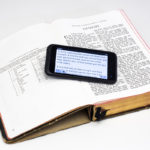- The Explore the Bible lesson for Dec. 20 focuses on Luke 2:4-19.
Our study this week focuses on that familiar “birth announcement” by the angels to those lowly shepherds that the long-anticipated Messiah and Lord had finally “been delivered.” The angel of God said to the shepherds: “Do not be afraid. I bring you good news that will cause great joy for all the people. Today in the town of David a Savior has been born to you; he is the Messiah, the Lord.” (Luke 2:10-11, NIV)
I like the familiar phrasing of the King James Version of verse 10 in which the angels simply say to those terrified tenders of the sheep, “Fear not.”
Multiple fears and anxieties
Think about that simple two-word angelic message, “fear not.” What a most perfect and most appropriate “good news” Christmas message for us today in the midst of this most unusual Christmas season of 2020. We certainly have a lot to be afraid of these days, don’t we? The past nine months have been filled with more fear and anxiety than the world has experienced in a generation. Psychology Today states: “Everything has changed so quickly. Suddenly everyone, everywhere in the world, is at risk of contracting COVID-19. It’s terrifying. And yet the contagion of fear may be worse than the virus for most of us.”
The fears in our world today are everywhere and they take on many different forms. Did you know that the American Psychiatric Association now list over 100 known “phobias.” And if that number doesn’t scare you enough, there’s even a phobia of numbers—arithmophobia! And just so you can cover all your bases, there’s even a fear of fear itself, phobophobia!
With the plethora of phobias that surround us today, there’s little wonder why “fear not” is the most repeated command in the Bible. In fact, is has been said that there are 365 “fear nots” in the Bible; that’s one “fear not” for every day of the year! Lloyd Ogilvie in Facing the Future without Fear even said there are 366 “fear nots” in the Bible, one for every day of the year including Leap Year! I haven’t fact checked those “fear not” statistics, but I think we get the point of what God is trying to tell us. We shouldn’t go through a single day without appropriating those reassuring words from the Father himself, “fear not.”
Five common fears
It’s interesting that that Christmas message of “fear not” is actually all over the Christmas story in the Scriptures. Pastor Rick Warren of Saddleback Church outlines five common fears associated with five common figures of that first Christmas:
- The fear of inadequacy (Mary). Mary was a young peasant girl planning to get married. But an angel interrupted her plan by telling her that she was pregnant with the Son of God. It shouldn’t surprise us she felt inadequate.
- The fear of disapproval (Joseph). In Matthew 1:18-20, the angel told Joseph to not be afraid and to take Mary home as his wife. You can imagine the ridicule and shame Joseph expected to face at home if his fiancée was pregnant.
- The fear of unexpected change (the shepherds). Put yourself in the shoes of the shepherds. They’re out lying on the grass and tending their flock of sheep. It’s all quiet. Suddenly, the sky lights up. A huge choir of extraterrestrial beings starts singing loudly. You’d be scared, right? The shepherds were. Their plans for a quiet evening were interrupted.
- The fear of losing control (Herod). The Jews didn’t like Herod—he ruled with a heavy hand because he was paranoid of getting overthrown. His insecurities caused him to lash out when he heard a new “King of the Jews” had been born.
- The fear of being disappointed (Zechariah). Zechariah and Elizabeth had prayed for years and years to have a baby, but it hadn’t happened. They had one setback after another. When Zechariah found out Elizabeth was pregnant, his first instinct was disbelief. He was afraid to get his hopes up
Not a ‘prisoner of our fears’
Billy Graham summarized it this way: “The very reason Jesus Christ came to Earth was to offer himself in sacrifice for our sin so that we might be reconciled to God and experience his kindness and mercy as his dearly loved children. It is his desire that you be completely set free from fears, torment and oppression so that you might experience his abundant life.” He added: “God doesn’t want us to be prisoners of our fears. The key is to learn to trust God, no matter what our fears are. And we can trust him, because he loves us, and he is greater than anything we’ll ever face. Furthermore, when we know Christ, we know he is with us every moment of the day, and that should give us comfort.”
We all hope and pray for “less fear” in our lives this Christmas. And while we may never totally escape the reality of fear in our lives, we can all certainly live “fearless” lives. And we can all do that if we all simply heed that angelic good news message of Christmas: “Fear not!”
Jim Lemons is professor of theological studies and leadership at Dallas Baptist University. He is a senior adult Sunday school teacher at Park Cities Baptist Church in Dallas.














We seek to connect God’s story and God’s people around the world. To learn more about God’s story, click here.
Send comments and feedback to Eric Black, our editor. For comments to be published, please specify “letter to the editor.” Maximum length for publication is 300 words.